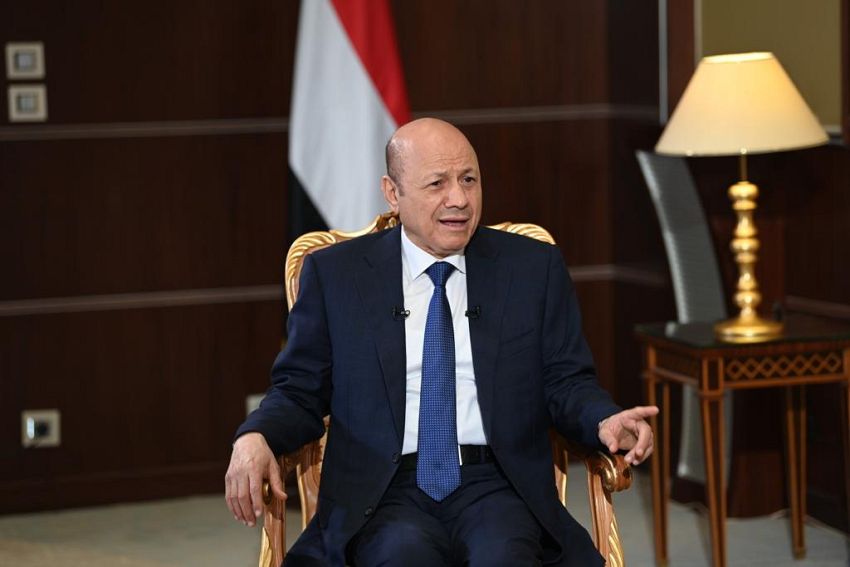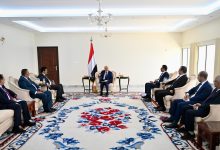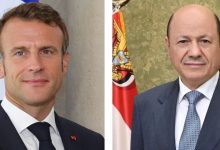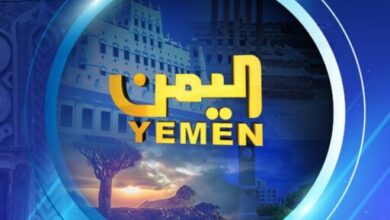The Chairman of the Leadership Council stated that we possess all evidence of Iran’s destructive role in Yemen and the region.
President Alimi Calls for International Action Against Houthi Militias

In a recent interview with the German newspaper Der Spiegel, President Dr. Rashad Mohammed Alimi, head of the Presidential Leadership Council, urged the international community to join efforts in imposing sanctions against the Houthi militias and to classify them as a global terrorist organization.
The Need for Houthi Designation as Terrorists
President Alimi emphasized that designating the Houthis as a terrorist group is crucial for isolating them economically. He argued that implementing United Nations Security Council resolutions and supporting the Yemeni government in restoring its official institutions are essential steps to secure the Red Sea and defeat the axis of evil, which includes Iran, the Houthis, and Al-Qaeda.
Iran’s Long-Term Strategy in the Red Sea
The President warned that Iran collaborates with Al-Qaeda and the Houthis, along with other terrorist organizations in the Horn of Africa, to execute a long-term strategy aimed at controlling the Red Sea. He highlighted that this strategy poses a threat to global interests.
Houthi Threats and Iranian Influence
President Alimi stated, “The Houthis aim to extort the world by threatening maritime routes, masking their destructive actions with misleading political justifications.” He pointed out that the Iranian vision for controlling the Red Sea is an old plan, with the Houthis serving as its executors.
He also noted that following the death of Hezbollah leader Hassan Nasrallah, Iran seeks to position Abdul-Malik Al-Houthi as his political and spiritual successor. Al-Houthi now claims in his speeches that Yemen is the center of resistance, a notion that aligns with his ambitions to become a prominent figure within the Iranian axis.
Increased Iranian Investment in the Houthis
The President remarked that Iranian investment in the Houthi group may now exceed what Hezbollah and Nasrallah previously received. He indicated that military support, which once went to the Syrian regime and Hezbollah, is now largely directed toward the Houthis. This includes appointing leaders from the Revolutionary Guard as ambassadors to the Houthi militia in Sana’a.
Violations of International Law
President Alimi discussed Iran’s ongoing violations of international laws regarding the arms embargo on the Houthis. He confirmed that the Yemeni government recently seized new shipments of weapons destined for Houthi-controlled areas. He asserted that the advanced weapons used by the Houthis in attacks on maritime navigation and regional interests did not originate from the Yemeni army but were acquired after the group’s coup against the national consensus in September 2014.
Evidence of Iranian Support
The President reiterated that Yemeni intelligence possesses ample evidence, including the presence of Iranian and Lebanese experts in Houthi-controlled regions. He stated, “The weapons used by the Houthis are identical to those in the Iranian arsenal.” Reports from the UN sanctions committee also confirm the Iranian origin of these weapons, which include cruise missiles, medium-range missiles, guided missiles, anti-ship weapons, surface-to-air missiles, and offensive drones.
The Houthi-Al-Qaeda Alliance
President Alimi revealed that the Yemeni government has evidence of an alliance between Iran and the Houthis with Al-Qaeda. He pointed to the release of Al-Qaeda prisoners, who were equipped with weapons and funds to carry out terrorist attacks in liberated provinces. He also mentioned the Somali authorities’ seizure of large quantities of weapons transferred by the Houthis to the Al-Shabaab militia, which is allied with Al-Qaeda.
The Challenge of Iranian Aggression
The President dismissed any notion that Tehran intends to change its destructive behavior, asserting that Iran aims to achieve its long-term strategic goals in the region. He characterized negotiations surrounding Iran’s nuclear program as mere tactics to further these objectives.
The Role of International Support
President Alimi expressed satisfaction that the international community is finally recognizing these realities. However, he stressed that airstrikes alone will not eliminate the threat to international maritime navigation. He stated, “The problem lies in the existence of a fascist group that overthrew our elected government ten years ago and has become a tool for the Iranian axis of evil.”
He concluded by emphasizing the need to defeat the destructive strategy of this theocratic project to rebuild Yemen, which its people deserve, and to maintain international peace and security.
Acknowledging the Coalition’s Support
President Alimi praised the role of the Coalition to Support Legitimacy, led by Saudi Arabia. He stated that without this coalition, the Houthis and Iran would have likely taken control of all of Yemen, extending to the borders of Oman. He noted that, with the coalition’s assistance, Yemen has liberated 70% of its territory. Additionally, over three million Yemenis work in Saudi Arabia, and without their remittances and Saudi support, Yemen would be in a far worse situation than it is now.
To follow the news in Arabic


